ScaleUp Dashboard 2019: Climate for fast-growing companies in the Netherlands has deteriorated
Despite economic prosperity, the increase in the number of fast-growing companies has more than halved in the past year. In addition, fewer startups are growing into fast-growing companies. This shows the ScaleUp Dashboard 2019, published by Erasmus Center for Entrepreneurship and Rotterdam School of Management, Erasmus University (RSM).
Want to see the full report? Click here!
Listen to the BNR Radio interview with Managing Director Martin Luxemburg about the ScaleUp Dashboard 2019.
The ScaleUp Dashboard is an annual research on fast-growing companies in the Netherlands led by prof.dr. Justin Jansen, Academic Director of Erasmus Centre for Entrepreneurship and Professor of Corporate Entrepreneurship at RSM. A fast-growing company, or scale-up, has at least 10 full-time (FTE) employees and an average growth of at least 20 percent per year in the number of FTEs over a three-year period.
The most important findings of the ScaleUp Dashboard 2019 are as follows:
- The increase in fast-growing companies in the Netherlands has more than halved in the past year. Whereas the number of fast-growing companies increased by 18 percent on an annual basis in 2017, the number of fast-growing companies only increased by 7 percent in the past year to 2,880 fast-growing companies in the Netherlands at the end of 2018.
- The number of startups that grow into a fast-growing company has decreased for the first time in years (by 1.8 percent).
- Almost two thirds of Dutch fast-growing companies lose their fast growth after their first growth spurt.
- Amsterdam has, yet again, achieved the highest number of fast-growing companies, followed by Rotterdam. Eindhoven is characterized by the largest percentage increase in the number of fast-growing companies compared to the previous year (+ 30%).
Climate for fast-growing companies in the Netherlands has deteriorated
Despite the positive comments about the Dutch economy, the climate for fast-growing companies appears to have deteriorated in the past year. “The research shows that a number of fundamental indicators of the scale-up climate in the Netherlands are not only orange but even red. The growth in the number of fast-growing companies has more than halved. The growth of young, fast-growing companies has even declined. We will have to go a step further and perform bold experiments for the development of innovative policy measures for fast-growing companies”, says Justin Jansen. “For example, startups experience considerable challenges in scaling up their earnings model, while existing fast-growing companies are experiencing difficulties in maintaining their rapid growth. This requires more specific support and individual guidance in the various life phases of a fast-growing company.”
Structural rapid growth often turns out to be too large a task
The ScaleUp Dashboard 2019 shows that many fast-growing companies achieve a first rapid growth spurt between their 5th and 8th year of establishment. However, two thirds of them subsequently lose their rapid growth in the following years. Martin Luxemburg, director of the Erasmus Center for Entrepreneurship, explains: “Despite a good starting position and a scalable revenue model, many fast-growing companies then struggle with attracting new talent, obtaining follow-up financing and organizing the explosive complexity of their organization. Research at companies that continue to grow structurally, such as Coolblue, Youngcapital and SecureLink, shows that they are simplifying things by identifying core values, delegating activities and applying critical performance indicators that enable employees to add value for current and new customers. ”
To download the full Scale-up Dashboard 2019 and find out more information about this research: www.scaleupdashboard.com.
Erasmus Centre for Entrepreneurship is continually collecting more in-depth insights on the characteristics of companies that become scale-ups. With this knowledge we conduct research on regional and municipal levels for the Brabantse Ontwikkelingsmaatschappij (BOM) and the municipality of Rotterdam. For any further questions, please contact us at: research@ece.nl or +31 10 302 1331
